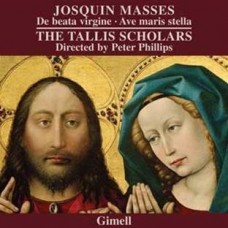您的購物車沒有添加專輯!
搜尋
德普瑞:童貞聖母彌撒曲、聖母頌彌撒曲 Josquin:Missa De beata virgine · Missa Ave maris stella
|
No one until now has mounted a serious and comprehensive retrospective of music by the composer who ranked higher than any other in the England of Henry VII and the young Henry VIII. Why Cornysh’s work should be so grossly overlooked today is hard to understand. A couple of antiphons have found their way on to record, but other pieces – including the astonishing Magnificat – here make their first appearance in the catalogue. Full credit, then, to The Tallis Scholars, not only for putting matters to right but also for doing so in performances that will thrill everyone who hears them. “Those who like to have their composers neatly pigeon-holed will note that Cornysh died in 1523, two years after Josquin Desprez. In practice it would be difficult to imagine a pair of contemporaneous composers (at least before the nineteenth century) more distant from one another in ideology and technique. Where Josquin’s music is orderly, Cornysh’s is a riot of abundant, often seemingly wild melody. Where Josquin customizes his music to the meaning and sound of the words, Cornysh sets off in search of wanton, abstract, dare-devil ideas. Take for example the extraordinary conclusion to the five-part Magnificat, where pairs of voices, rising in turn from the lowest in the choir to the highest, are challenged with music of gradually increasing complexity, peaking in an exchange of quite hairraising virtuosity between the sopranos – and all this just for the words ‘and ever shall be, world without end’! “As far as the sacred works are concerned, The Tallis Scholars respond magnificently to Cornysh’s audacious imagination. Choosing high treble pitch for the pieces with proper soprano parts, Peter Phillips has faced his women singers with what must surely have been their Waterloo, and they emerge victorious: it is a majestic and glorious sound, to be relished in full in the Stabat mater, a huge piece that survives incomplete and for which the late Frank Harrison composed treble parts that may even trump Cornysh himself in their sheer bravura. Marginally less striking in The Tallis Scholars’ performances are the short part-songs and the carol Woefully arrayed, robbed as they are here of some of their latent expressiveness and strength by being sung (admittedly very beautifully) in an inappropriately resonant building, and in rounded modern English vowels rather than their brighter, more robust Tudor equivalents. But judged as a whole this record must be reckoned an outstanding success, and a long overdue tribute to one of Britain’s most exotic musical geniuses.” |
|
Missa De beata virgine [38'03] 1 Kyrie [4'25] 2 Gloria [9'53] 3 Credo [9'09] 4 Sanctus and Benedictus [7'47] 5 Agnus Dei [6'49] 6 Credo quarti toni 'Cambrai Credo' [9'23] 7 Ave maris stella [0'36] Anonymous - Medieval, Christopher Watson (tenor) Missa Ave maris stella [27'56] 8 Kyrie [2'49] 9 Gloria [5'06] 10 Credo [7'06] 11 Sanctus and Benedictus [7'54] 12 Agnus Dei [5'01] |
編號 |
曲目 |
長度 |
作詞 |
作曲 |
演奏 |
樂團 |
演唱 |
指揮 |
試聽 |
|---|


